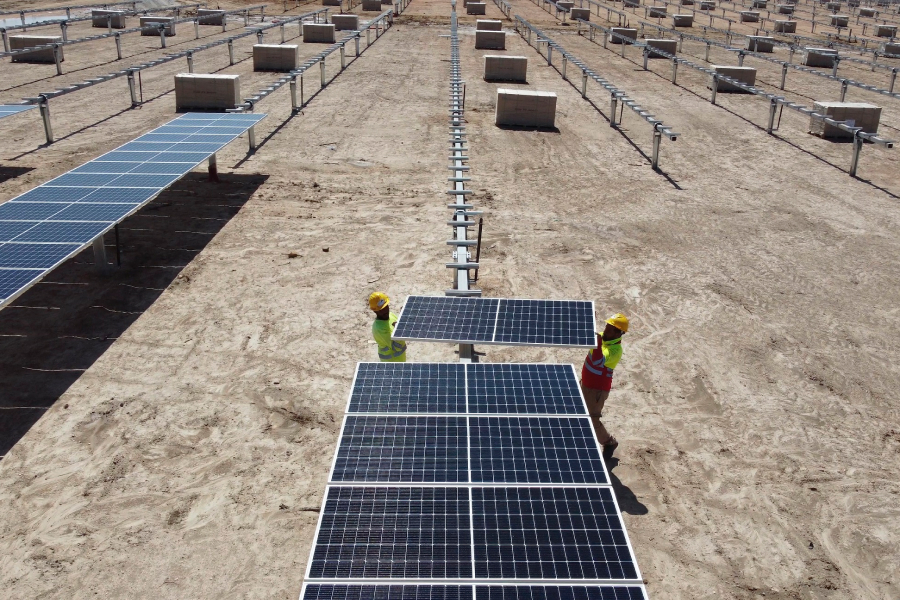The new Ciudad Rodrigo plant, which is being built in the province of Salamanca and will have a capacity of 316 MW, will generate enough clean energy to supply 150,000 homes a year and will avoid the emission of 75,000 tons of CO2 into the atmosphere annually.
This solar installation is part of the alliance between Iberdrola and Norges Bank Investment Management.
The construction of this renewable installation, whose investment reaches 200 million euros, will have a significant local component – It is expected that during peak work periods up to 800 workers and numerous industrial suppliers will be involved in the project.
The towns emerge as a guarantee for the future with numerous initiatives around ‘green’ principles that drive their activity and their population.
Iberdrola Spain is making progress on the construction of one of its largest photovoltaic projects in Castilla y León, the new ‘Ciudad Rodrigo’ plant, which is being built in the province of Salamanca – in the areas of Valdecarros and the Torralba mountain range, just 5 km from the city centre – and will have a capacity of 316 MW.

This solar installation, which is part of the alliance between the Iberdrola Group – of which Iberdrola Spain is a part – and Norges Bank Investment Management, will generate enough clean energy to supply 150,000 homes per year and will avoid the emission of 75,000 tons of CO2 into the atmosphere annually. In addition, this plant has reached a long-term purchase agreement (PPA).
The construction of this renewable plant, with 589,000 photovoltaic modules, whose investment reaches 200 million euros, will have a significant local component. It is expected that during peak work periods up to 800 workers and numerous industrial suppliers from Salamanca will be involved in the project, such as the company Tecinsa, which will build the transformer substation, the cranes from Pérez Coco or Maderas Caeval, carrying out the clearing. In addition, companies from the municipality itself are being involved, such as Solar B-Max, which will carry out the mechanical assembly, different concrete companies, such as Sánchez Cepa and Montero, Presan as a supplier of materials or the rental machinery Miróbriga.
Iberdrola Spain is working on numerous initiatives that combine the installation of renewable projects with the conservation of the biological diversity of ecosystems, taking care of flora, fauna and natural heritage. In this case, it will carry out the restoration of habitats of community interest.
Furthermore, a new pond will be placed in the surroundings of the plant to complement the hydrological network that is formed in the surroundings of the facility given the importance of the herpetofauna in the area and ‘insect hotels’ will be installed taking advantage of the green areas between the photovoltaic panels and close to the existing ponds to encourage the presence of pollinators and other groups of invertebrates in the area. As a complementary measure, nest boxes will be placed for lesser kestrels and majanos will be built in the surroundings of the project as a refuge for the wild rabbit.
In addition, an agreement has been reached with the City Council of Ciudad Rodrigo to carry out the restoration of the Plaza Amayuelas. The execution of this project is planned in two phases that correspond to the northern halves, towards the wall, and the southern halves, towards the atrium of the cathedral. The proposal for the reform and adaptation of the square of the Salamanca town aims to reverse its current character of residual and unused space by means of its spatial, functional and symbolic recovery. The idea is to reinsert it into the collective memory by activating its role as a space for presenting the city, for interpreting its past and for a privileged stay. Iberdrola has also promoted, within the framework of the company’s commitment to the province, the “Astróbriga” Solar System, which is a reproduction of the solar system, on a scale of 1/290,000,000. It is a tool for carrying out activities aimed at promoting the region at a tourist level and developing educational and scientific dissemination activities in the area.
Iberdrola Spain’s commitment to biodiversity
Iberdrola Spain is committed to a sustainable energy model in harmony with nature and people. This model is based on two main objectives: achieving zero net emissions in all areas before 2040 and having a net positive impact on biodiversity by 2030, according to the Biodiversity Plan.
Iberdrola Spain has recently published its Biodiversity Report, which includes its strategy and the actions carried out over the last 2 years, which total more than 1,800.
The company has also launched the Convive Programme, which includes a multitude of measures to ensure that renewable installations are fully compatible with biodiversity, agriculture, livestock farming and even beekeeping. For example, some photovoltaic installations have become true refuges for biodiversity, which have even allowed endangered species to find a suitable space to live (e.g. free of pesticides and disturbances).
In Castilla y León, in collaboration with the mushroom and fungi production company Fungi Natur, Iberdrola Spain launched the first mushroom cultivation project in Spain in the Revilla Vallejera plant in Burgos in photovoltaic installations, which makes it possible to take advantage of the countryside and the shade of the panels to promote local work and the development of agriculture, while saving water and improving the quality of the harvest.
In addition, 600 sheep graze daily in the premises of this facility, a clear example of integration between renewables, nature and local economy.


